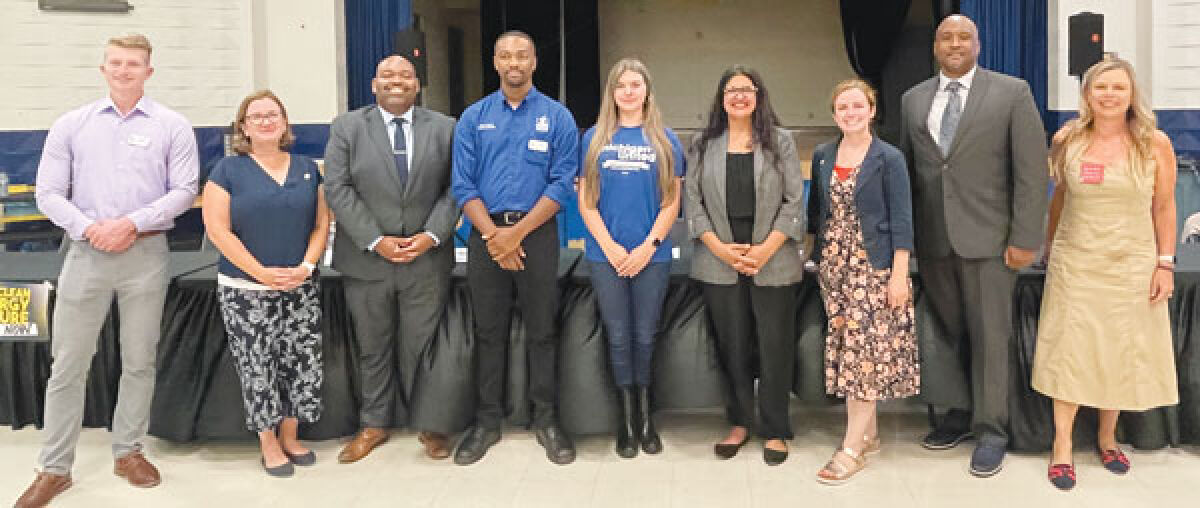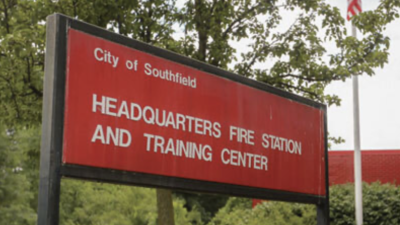SOUTHFIELD — Levey Middle School was the site of a discussion on climate, renewable energy and job benefits Sept. 6.
U.S. Rep. Rashida Tlaib, D-Detroit, led a community discussion panel centered on the Inflation Reduction Act of 2022.
The act is touted as the largest clean energy investment in U.S. history, allocating $369 billion for solar and wind farms, manufacturing batteries, electric vehicles, pollution reduction in environmental justice communities, and rebates and credits for increasing energy efficiency and transitioning homes, businesses and schools to electric power.
Tlaib was joined by state Reps. Jason Hoskins, Dylan Wegela, Natalie Price and Erin Byrnes, Joy Southfield Community Development Corporation’s Gary Ringer, Moms Clean Air Force’s Elizabeth Hauptman, Michigan United’s Em Perry, and the Southfield Board of Education and Michigan League of Conservation Voters’ Amani Johnson. The panel was moderated by Hudson Villeneuve, the federal government affairs coordinator for the Michigan League of Conservation Voters.
“Why I do this work is I thought it was normal to smell like hydrogen sulfide after playing outside. I thought it was normal dodging that many trucks. I thought it was normal that everybody in my classroom had asthma. And as I got older and realized we were paying a huge toll in housing corporate polluters, and to our detriment,” native Detroiter Tlaib said. “I watched the pandemic layered on top of that, and many of our folks getting sicker and many dying at a higher rate because of preexisting conditions due to environmental injustices, including environmental racism, where many of these high polluting companies and folks were in neighborhoods that are already challenged, and also incredibly diverse.”
Hoskins explained that the government has made the funds and grants on a local level more accessible, allowing local jurisdictions to apply and implement clean energy procedures in their communities.
Perry shared that communities looking to apply for the clean energy grants can reach out to Michigan United for help with the grant writing process. Michigan United is a nonprofit dedicated to fighting for the rights of homeowners, renters, immigrant families and students.
“This is exactly what we do,” Perry stated. “We’ve worked with a few different municipal governments to get them to write a letter of intent, saying that they’re going to be applying for some of these grants and helping them with the actual grant process, letting them know when the deadlines are and what things are available.”
Hoskins added that at the state level, representatives are given the opportunity to vote on allocating funds toward clean energy initiatives.
Wegela said pending House environmental packages would help the state capture twice the amount of funding through the Inflation Reduction Act.
“According to the math I’ve been looking at, according to the Intergovernmental Panel on Climate Change, we have approximately five years, 380 days and now 17 hours to prevent a 1.5-degree Celsius increase in our climate,” Wegela said.
The house bills that Wegela mentioned are HB 4759, which establishes a renewable portfolio standard of 60% by 2030 and a goal of 100% carbon-free energy by 2035; HB 4760, which allows the Michigan Public Service Commission to consider climate factors, affordability and equity in its decision-making, and requires them to abide by those decisions and HB 4761 which updates and expands the energy waste reduction standards for utilities. It also revamps the timeline for meeting standards and measuring cost savings and prioritizes low-income communities to benefit from energy efficient programming.
Byrnes expressed the importance of ensuring that there are “measurable, demonstrable outcomes” and language accessibility that is inclusive for the diverse communities across Michigan.
Amani Johnson, a representative for Southfield Public Schools, said school districts are able to use grant funds towards solar panels, renewable energy, energy efficiency upgrades, lighting, heating and cooling, and green transportation.
“There’s the educational piece. Implementing all of these different environmental changes in our community, in our district, are opportunities to educate our students about climate change and have them interact with technology like solar panels,” Johnson said. “Maybe they’ll be interested in going into a green career at some point. And the last thing I’ll mention is more community gardens, more rooftop greenery, more green spaces. It’s also something that helps to reduce costs but provides benefits for our students.”
Hauptman echoed Johnson’s sentiments about the importance clean energy plays in helping children succeed.
“Our children’s hearts, lungs and brains are still developing, and pollution disproportionately impacts them,” she stated. The Moms Clean Air Force works to address the environmental stressors impacting children’s health and well-being by providing education about how air quality issues impact families, particularly women and children. They also provide schools with educational resources regarding electric school bus funds.
The forum encouraged community members to take action and hold lawmakers accountable.
Tlaib emphasized the importance of accountability and ensuring that grant dollars are going towards green energy initiatives.
“Oversight is so important. People don’t realize this: We spend those resources, the grant opportunities, but we have to circle back around and make sure, again, it was implemented in a way that did actually result in addressing the climate crisis,” she said.
For more information about the Michigan League of Conservation Voters, visit michiganlcv.org.
For more information about Michigan United, visit miunited.org or contact their grant writer, Kate Mason, at kmason@miunited.org for help applying for an Inflation Reduction Act grant.
For more information about Moms Clean Air Force, visit momscleanairforce.org.
 Publication select ▼
Publication select ▼



























